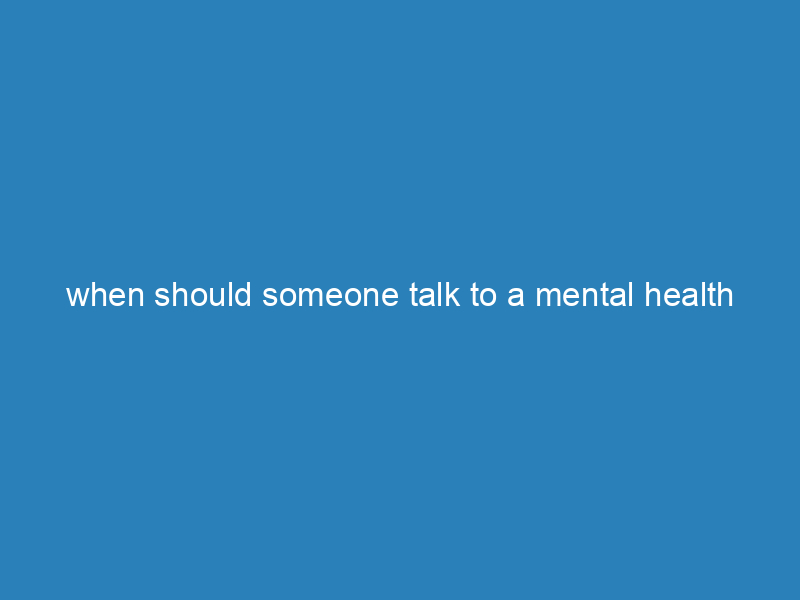
Recognizing the Signs: When to Seek Help for Unwelcome Thoughts and Emotions
When should someone talk to a mental health professional about unwelcome thoughts or emotions? It’s a question that many people grapple with, often unsure of when it’s appropriate to seek help. But the truth is, if you find yourself experiencing persistent, distressing, or overwhelming thoughts and emotions, it may be time to reach out for support.
Understanding Unwelcome Thoughts and Emotions
Unwelcome thoughts and emotions can take many forms, from persistent anxiety and worry to overwhelming sadness or anger. These feelings can interfere with daily life, making it difficult to concentrate, sleep, or engage in activities that were once enjoyable. It’s important to recognize that these thoughts and emotions are not a sign of personal weakness or failure, but rather a natural part of the human experience.
When should someone talk to a mental health professional about unwelcome thoughts or emotions? It’s important to pay attention to the frequency and intensity of these feelings. If they persist for an extended period of time, or if they begin to impact your ability to function in your daily life, it may be time to seek help.
Recognizing the Signs
There are several signs that may indicate it’s time to talk to a mental health professional about unwelcome thoughts and emotions. These signs can vary from person to person, but some common indicators include:
- Feeling consistently overwhelmed or unable to cope with stress
- Experiencing persistent feelings of sadness, hopelessness, or despair
- Harming oneself or having thoughts of self-harm
- Avoiding social activities or withdrawing from loved ones
- Engaging in destructive behaviors, such as substance abuse or compulsive gambling
If you find yourself experiencing any of these signs on a regular basis, it may be time to seek help from a mental health professional. Remember, it’s okay to ask for support, and doing so is a sign of strength, not weakness.
When to Seek Help
Deciding when to seek help for unwelcome thoughts and emotions can be a difficult decision. Many people struggle with feelings of shame or embarrassment about reaching out for support. But it’s important to remember that mental health professionals are trained to help individuals navigate these challenging thoughts and emotions.
When should someone talk to a mental health professional about unwelcome thoughts or emotions? It’s important to seek help if you find that your feelings are interfering with your ability to work, study, or engage in daily activities. Additionally, if you are experiencing thoughts of self-harm or suicide, it is crucial to reach out for support immediately.
Remember, you don’t have to navigate these feelings alone. There are trained professionals who can help you develop coping strategies and provide the support you need to navigate challenging emotions.
Conclusion
Recognizing the signs of unwelcome thoughts and emotions is the first step toward seeking help. It’s important to pay attention to the frequency and intensity of these feelings, and to reach out for support if they begin to interfere with your daily life. Remember, it’s okay to ask for help, and doing so is a sign of strength, not weakness. Mental health professionals are trained to help individuals navigate these challenging thoughts and emotions, and seeking support is an important step toward healing and recovery.
FAQs
Q: When should someone talk to a mental health professional about unwelcome thoughts or emotions?
A: It’s important to seek help if you find that your feelings are interfering with your ability to work, study, or engage in daily activities. Additionally, if you are experiencing thoughts of self-harm or suicide, it is crucial to reach out for support immediately.
Q: What are the signs that indicate it’s time to talk to a mental health professional about unwelcome thoughts and emotions?
A: Signs may include feeling consistently overwhelmed, persistent feelings of sadness, self-harm, or engaging in destructive behaviors such as substance abuse.
when should someone talk to a mental health professional about unwelcome thoughts or emotions?
Recognizing the signs of unwelcome thoughts and emotions is a crucial step in seeking help for mental health struggles. It’s important to pay attention to any changes in your mood, thoughts, or behaviors, as these could be indicators that something is off. If you find yourself feeling consistently sad, anxious, irritable, or withdrawn, it may be time to seek help. Additionally, if you experience persistent negative thoughts, lack of motivation, or difficulty concentrating, it’s important to recognize these signs as potential mental health issues and reach out for support.
When it comes to recognizing unwelcome thoughts and emotions, it’s important to pay attention to any changes in your behavior. If you find yourself avoiding social situations, having difficulty sleeping, experiencing changes in appetite, or engaging in self-destructive behaviors, these may be signs that you need to seek help. Also, if you notice a significant change in your energy levels, such as feeling constantly fatigued or having trouble getting out of bed, it’s important to recognize these signs as potential indicators of mental health struggles.
Another important aspect of recognizing unwelcome thoughts and emotions is being aware of any physical symptoms that may be present. This could include aches and pains, headaches, stomach issues, or other physical discomfort. These physical symptoms can often be linked to mental health struggles, so it’s important to take them seriously and seek support if you are experiencing them.
In addition to paying attention to your own thoughts and emotions, it’s important to listen to the concerns of those around you. If friends or family members express worry about your well-being, it’s important to take their concerns seriously. Often, loved ones can notice changes in our behavior that we may not recognize ourselves, so it’s important to listen and consider seeking help if others express concern for your mental health.
It’s also important to recognize the impact that unwelcome thoughts and emotions can have on your daily life. If you find that these struggles are interfering with your ability to work, socialize, or take care of yourself, it’s important to seek help. Mental health issues can have a significant impact on many areas of our lives, so it’s important to recognize when these struggles are affecting our ability to function.
Recognizing the signs of unwelcome thoughts and emotions is the first step in seeking help for mental health struggles. By being aware of changes in your mood, thoughts, behaviors, and physical symptoms, you can take proactive steps to address any potential mental health issues. It’s important to listen to the concerns of loved ones and consider the impact that these struggles may be having on your daily life. Seeking help for mental health struggles is not a sign of weakness, but rather a proactive step towards improving your well-being. If you recognize these signs in yourself, it’s important to reach out for support from a mental health professional or trusted support system. when should someone talk to a mental health professional about unwelcome thoughts or emotions?







